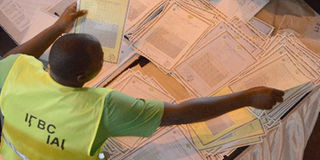Diaspora Kenyans form team to mobilise voters

An IEBC official inspects election forms on March 7, 2013. FILE PHOTO | NATION MEDIA GROUP
Kenyans in the diaspora have formed a committee to help mobilise citizens living in foreign countries to register as voters in readiness for the 2017 elections.
The creation of the committee follows a dismal response to the ongoing voter-mapping programme launched launched three months ago by the Independent Electoral and Boundaries Commission (IEBC) that has attracted only a small number of people.
The Kenya Diaspora Alliance (KDA) announced that the committee, to be known as the Legal/Voting Rights Implementation Committee, would be chaired by Minnesota-based lawyer Henry Ongeri.
Mr Ongeri is known for championing voting rights for people in the diaspora and members of his team are to be drawn from different parts of the world where Kenyans have settled.
Dr Ekuru Aukot, a Kenyan constitutional lawyer, is also a member of the committee.
“Among other functions the committee is tasked with monitoring and evaluation of the process ahead of the forthcoming general elections,” read a statement released by the KDA.
The statement further said the organisation would keep an eye on the mandatory annual reports, which the IEBC is supposed to deliver to the National Assembly as ordered in the judgment in the case brought by the KDA against the electoral commission.
The organisation also criticised the IEBC for locking out the diaspora in the recent voter education programme.
198 KENYANS
It is claimed that Kenya has about three million nationals living in foreign countries but the voter-registration mapping exercise by the IEBC had only mapped some 198 people in various countries around the world.
Some of the Kenyans in the diaspora were jittery about the questions being asked by the commission in the questionnaire posted on the diaspora portal.
Said Dr Shem Ochuodho: “The commission is not supportive. They spent more time in fighting Kenyans abroad instead of working with them to make things easier.”
Dr Ochuodho, who lives in South Sudan, was behind the case filed in the Kenyan courts that led to voters in the diaspora being allowed to vote in all the six elections in the country.
He said the IEBC strategy in past engagements with the diaspora was dependent on embassies, which he claimed had lost touch with Kenyans abroad.
He said only one to five per cent of Kenyans living abroad were in touch with their respective embassies.
KDA Communications Director Ali Badawy told the Nation that the IEBC portal mapping strategy had failed because a majority of the people in the diaspora did not trust the commission and its initiatives.
“I can guarantee you that 0.01 per cent of Kenyans in (the) diaspora know about the so-called portal, (and) as such it is bound to fail,” Mr Badawy said.




